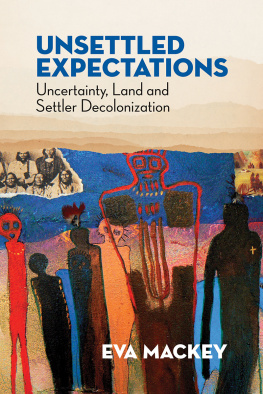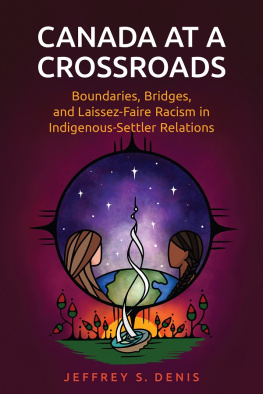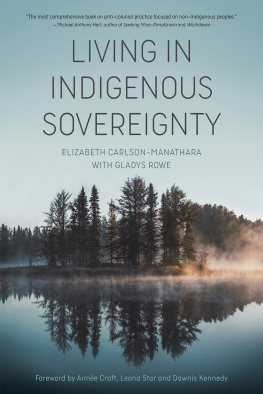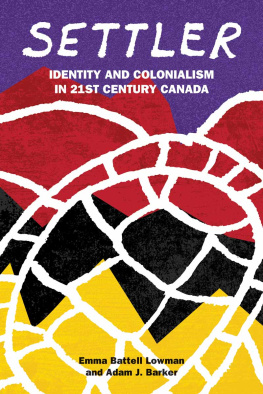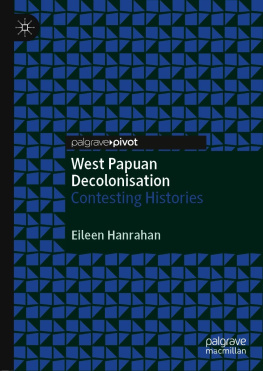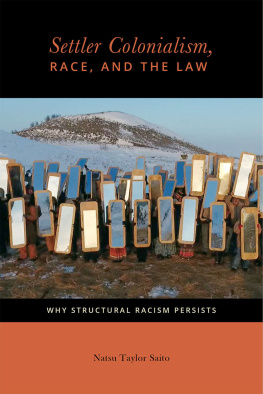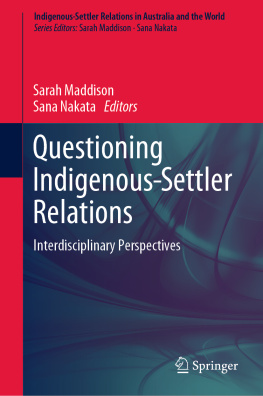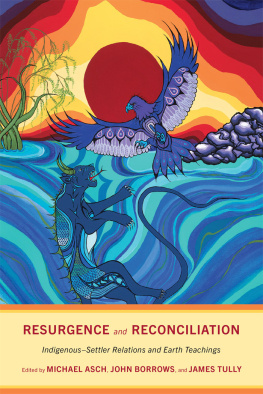UNSETTLED EXPECTATIONS
UNSETTLED EXPECTATIONS
Uncertainty, Land and Settler Decolonization
EVA MACKEY
FERNWOOD PUBLISHING
HALIFAX & WINNIPEG
Copyright 2016 Eva Mackey
All rights reserved. No part of this book may be reproduced or transmitted in any form by any means without permission in writing from the publisher, except by a reviewer, who may quote brief passages in a review.
Editing: Penelope Jackson
Cover image: Generations used with permission of artist, Jane Ash Poitras
Cover design: John van der Woude
eBook: tikaebooks.com
The poem Even after Everything by Robin Kimmerer
is reprinted with permission of the author.
Printed and bound in Canada
Published by Fernwood Publishing
32 Oceanvista Lane, Black Point, Nova Scotia, B0J 1B0
and 748 Broadway Avenue, Winnipeg, Manitoba, R3G 0X3
www.fernwoodpublishing.ca
This book has been published with the help of a grant from the Federation for the Humanities and Social Sciences, through the Awards to Scholarly Publications Program, using funds provided by the Social Sciences and Humanities Research Council of Canada.
Fernwood Publishing Company Limited gratefully acknowledges the financial support of the Government of Canada through the Canada Book Fund, the Manitoba Department of Culture, Heritage and Tourism under the Manitoba Publishers Marketing Assistance Program and the Province of Manitoba, through the Book Publishing Tax Credit, for our publishing program. We are pleased to work in partnership with the Province of Nova Scotia to develop and promote our creative industries for the benefit of all Nova Scotians. We acknowledge the support of the Canada Council for the Arts, which last year invested $153 million to bring the arts to Canadians throughout the country.

Library and Archives Canada Cataloguing in Publication
Mackey, Eva, 1956-, author
Unsettled expectations : uncertainty, land and settler
decolonization / Eva Mackey.
Includes bibliographical references and index.
Issued in print and electronic formats.
ISBN 978-1-55266-889-4 (paperback).--ISBN 978-1-55266-898-6
(epub).--ISBN 978-1-55266-899-3 (kindle)
1. Indians of North America--Land tenure. 2. Indians of North America--Claims. 3. Indians of North America--Legal status, laws, etc. 4. Decolonization--Canada. 5. Decolonization--United States. I. Title.
E98.L3M32 2016 333.2 C2016-903189-6
C2016-903190-X
CONTENTS
PART ONE
CONTACT ZONES AND THE SETTLER COLONIAL PRESENT
PART TWO
ONTOLOGICAL UNCERTAINTIES AND RESURGENT COLONIALISM
PART THREE
IMAGINING OTHERWISE: EMBRACING SETTLER UNCERTAINTY
Dedicated to Eleanor Mackey,
who always embraced life with creative uncertainty.
1932 2014
ACKNOWLEDGEMENTS
T his book took many years to research and write, and on that journey I have grown indebted to many, many people. I would like to start by thanking all the people who spoke with me and whom I interviewed while doing research for this book. I especially thank Brooke Hansen, Bernadette (Birdie) Hill, Frieda Jacques, Ada Jacques, Andy Mager, Ernie Olson, Irving Powless, Jack Rossen, Julie Uticone, and Jim Uticone. I am also thankful to the many others who wished to remain unnamed.
I want to give special thanks for warm friendship, careful reading, and brilliant comments on early drafts to Jennifer Henderson, Davina Bhandar, Julie Marcus, Allison Mackey, and Samah Sabra. I am deeply thankful to Michael Asch for urging me to think about jurisdiction and other important things. I have been sustained and propped up by friends and family, and am so grateful for your support over the years, no matter how many kilometers have kept us apart: thank you Rahnuma Ahmed, Shahidul Alam, Natasha Ballen, Keith Denny, Jasmin Habib, Sal Houghton, Mike Ma, Robin Peace, Tracy Porteous, Becki Ross, Pat Williams, Judy Millen, Clarke Mackey, Doug Mackey, Elly Mackey, Ariel de Leon-Mackey, Mateo de Leon-Mackey and Gustavo de Leon. I am always thankful to my ever-supportive and inspirational mentors from long ago at Sussex: Susan Wright and Brian Street.
For their energy and passion about these issues, I thank the superb MA and PhD students I have been fortunate to work with over the years: Robyn Green, Kelly Black, Charlotte Hoelke, Diana Cullen, Shaun Stevenson and students in the Decolonizing Canada graduate seminar since 2010. I also thank research assistant Nicki Thorne. I so appreciate the support I received from my superb colleagues at McMaster Department of Anthropology (especially Harvey Feit and Matthew Cooper), and my wonderful colleagues at the Carleton School of Indigenous and Canadian Studies, especially my friends Jennifer Adese, Kahente Horn-Miller, Anne Trpanier and Cathy Schmueck. I am particularly thankful for the unfailing support of the School Director, Peter Hodgins, who ensured I had time and space to finish this book.
For helpful comments on papers I have presented on this research, Id also like to thank workshop and panel participants at two BRCSS Virtual Seminars at Massey University, New Zealand, in 2011, especially Avril Bell; the Crabgrass Gang for feedback at the workshop in Victoria in 2008; participants in the McMaster Centre for Globalization and the Human Condition workshop in 2007; and members of Department of Educational Anthropology, Danish University of Pedagogy, Copenhagen, Denmark, in 2005. I am thankful for the comments from the anonymous reviewers of earlier drafts, most especially for the perceptive and generous commentaries from the Fernwood reviewers. I also want to give special thanks to Robin Wall Kimmerer for permission to include her poem as the epilogue.
I wish to acknowledge the financial support I have received from the Social Sciences and Humanities Research Council of Canada, McMaster University, and the Fulbright Scholarship Commission.
Some of the material in this book was previously published in portions of essays and book chapters, and is reprinted with permission here. Publications include: Unsettling Expectations: (Un)certainty, Settler States of Feeling, Law, and Decolonization, Canadian Journal of Law and Society / Revue Canadienne Droit et Socit (2014) 29: 235252; Competing or relational autonomies? Globalization, Property and Friction Over Land Rights. In William D. Coleman (ed.) Property, Territory, Globalization: Struggles over Autonomy (2011), pp. 148-171, Vancouver: UBC Press; and Universal Rights in National and Local Conflicts: Backlash and Benevolent Resistance to Indigenous Land Rights, Anthropology Today (2005) 21, 2:1420.
Words are not sufficient to communicate my appreciation to Candida Hadley, extraordinary editor, Penelope Jackson, superb copyeditor, and others at Fernwood Publishing. And finally, and as always, to Mary Millen.
Part One
CONTACT ZONES AND THE SETTLER COLONIAL PRESENT
INTRODUCTION
Settler Colonialism and Contested Homelands
T he wave of panic in Chatham-Kent, Ontario, began in December 1998 when the Canadian federal government announced that it had made an Agreement in Principle with the Caldwell First Nation to resolve its outstanding land claim near Blenheim, Ontario. If the Caldwell members approved the agreement, the First Nation would receive $23.4 million to purchase 4,500 acres of land over 25 years on the open market, land that could eventually be designated a reserve. When the government called a public town hall meeting in Blenheim to discuss the agreement with local citizens, more than 2,500 people came out, and the meeting was volatile and uproarious. Many people attending shouted at the government speakers, claiming that they had not been consulted; others yelled that a reserve would drive up land prices and destroy local farming. Some residents passed around a petition asking Ottawa not to allow a new reserve in the area, a petition they said more than two-thirds of the people at the meeting signed (Crouch 1998). According to one reporter, only two Native people were visible at the meeting, and there was no presentation by the Caldwell Band. However, three Ontario Provincial Police officers were on hand for crowd control (Crouch 1998). Several people told me afterwards that one of the most striking moments of the meeting occurred when a woman from the area, Jackie Gladstone, stood up in the audience in the midst of jeers and yelling. She tearfully apologized to her neighbours for mistakenly selling a piece of land to the Natives. She said she had not known they were Natives or that they were starting a reserve.

